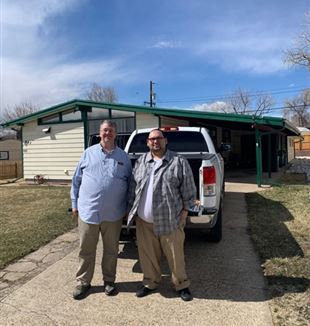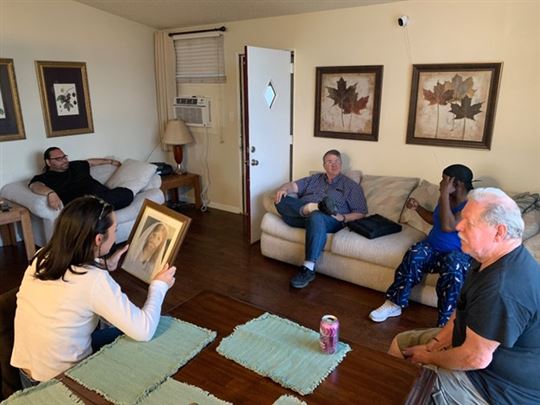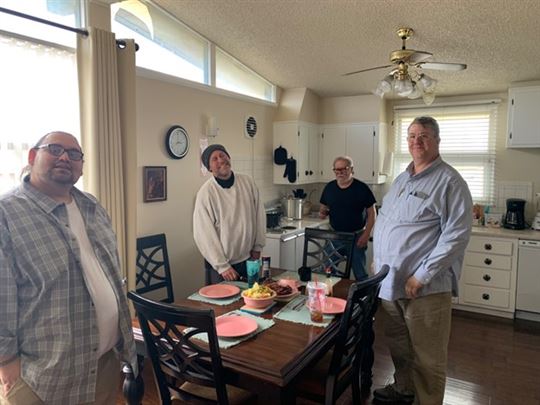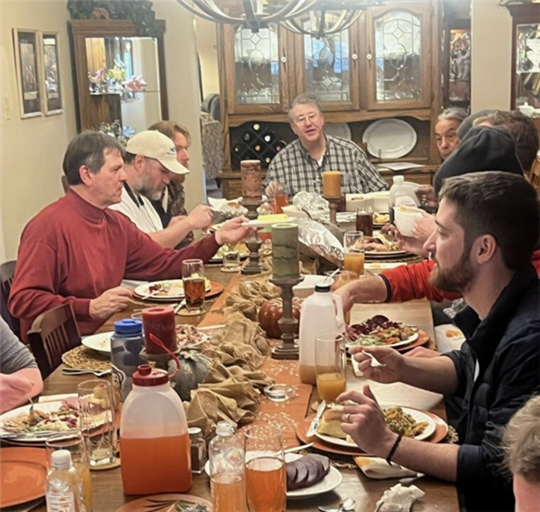
In My Father's House
An interview with the founder of My Father’s House, Jim Blum. An earlier version was published in Italian on IlSussidiario.net on December 25, 2023I sit down with an old friend, Jim Blum. Jim is a big man and a great man. He spent twenty years incarcerated in Colorado and when he was unexpectedly granted parole, he decided to found My Father’s House. MFH is a nonprofit that, since its foundation in 2017, has accompanied more than fifty men in the long process of reentering society. The name of the organization comes from the Gospel of John chapter 14: “In my Father’s house there are many dwelling places.” From a house purchased through personal debt to three houses with four beds each, Jim has grown into a discreet and trustworthy presence. The Colorado Department of Corrections counts on him and organizations like his to face a problem that few have the resources or the courage to face: welcoming back into society people who have committed a crime. I worked with Jim for a year and a half through a project of AVSI-USA called the Restorative Freedom Initiative. We have created a partnership with the APAC in Brazil, one of the most successful models of restorative justice, to learn and adapt their methodology to the American context. Jim and I are not new to long conversations on zoom, but this time I put on the hat of a pseudo-journalist and hit the record button.
I have summed up your story, Jim. I’ve heard it so many times from your live voice. Can you tell me how My Father’s House has changed over its six years of existence?
MFH started with me volunteering my time and with one house. We were essentially a for-profit business because I would sign a lease with each individual man who then had to pay immediately when he got there, otherwise I couldn’t make the mortgage payments. That excluded people who couldn’t afford that kind of immediate payment. Over the years, we have been able to get the funding necessary to provide a safety net to allow men to come and live with us for a month or two without any cost to them. This opened it up to a broader group of people and gave the men some breathing room to get settled and get a job to move forward.
Another change is that when I first began MFH I didn’t really want to do any programming, or at least ‘programming’ as people would define it in the context of prison or re-entry. I was telling myself: “I don’t want to be these guys’ nanny, I don’t want to be their daddy, I want to get some adult men who want to move forward and who need some assistance to do that.” But, honestly, I have found that those men are pretty few and far between. Most of these guys do need some programming and someone to tell them what they should or shouldn’t be doing. I still struggle with that because I keep wanting to say: “I don’t want to be your nanny, I don’t want to tell you what to do, you should be able to figure this out.” But even today, I am dealing with a young man who is sitting around the house doing nothing – not looking for a job, hanging out – and I am going to have to tell him that he has to get his life together, and it’s frustrating to me because I don’t want to have to do that. I know that he is going to be mad at me and this is not my fault! So, because of situations like this, we started to develop some programming, also with the help of the APAC in Brazil. I learned that there is a purpose to that, and that it is necessary.
Can you explain the importance of that breathing room when the guys first come to MFH?
When I got out of prison I had everything I needed. I had a place to live, food to eat, clothes to wear, transportation, and there was no reason to panic and think: “If I don’t get a job this week I am going to be out on the street”. And that is huge because it gets you out of survival mode and into a place in which you can pause, think, and make a plan for this future that you are stepping into.
And how has MFH changed you?
I’d like to say that I am wiser than I was and that I learned some lessons along the way in terms of business and the nonprofit world. It has made me step outside of my comfort zone in regards to networking. 
In addition to that, I recognize that this work has in some ways made me more willing to give grace, and more willing to be merciful – or give guys more room.
What do you mean when you say, I learned to give grace?
I'm a pretty conservative guy from the standpoint of not depending upon other people to give me stuff that helps me to live. That said, I do accept gifts from my family, and I did take food stamps when I first got out which I swore I would never do when I was younger. But now I have lost thousands of dollars to men over the years who just didn't pay their bills and finally I gave up and stopped asking. And that's new. I would not have done that in the past.
Why did you do it?
I mean, I could sue these guys but it's not worth the time and energy to do it. But in part it’s because I know they don't have it. For instance, there is a man who owes My Father’s House about $1,400 and he doesn't have it. I don’t think he's ever going to have it. I do continue to ask him about it from time to time and he swears that he's going to pay it back but he's not. So, yeah, giving grace.
What is the part of your work that gives you the most joy and why?
My favorite thing to do is to go and pick a man up from prison the first day he is released. It’s a frenetic time for him and he’s scared to death, but it’s also a new beginning for him. When I go to those prisons, even today seven years later, I can taste the copper in the back of my throat, the adrenaline is rushing. Those places are evil and the things that happen inside those places are horrible, and I don't want to be there. I don't want to drive down to Canon City to the prison, but when I pick him up and we drive out of the parking lot, I'm freed again and he is also free. It's like going to ransom a slave or buy a Christian back from the Saracens or save somebody from a kidnapper. I don’t mean to say that these men didn't deserve to be where they were and that I didn't deserve to be where I was because we did. But we don't deserve the things that went on there. In addition to that, just seeing the men grow and thrive: get a job, pass milestones, get a vehicle, or make some breakthrough in treatment, make a new connection back with family –whatever positive thing it is that makes them happy. I love to see it and that's the best part of my work.
Since I met you, I have seen different versions of a community that was born out of the work that you do. How important is that community to you?
It’s very important! So many people in the world – not just prisoners – are alone in the midst of a crowd and feel a great sense of loneliness and isolation. It’s a part of the human condition, I think, that people want to feel a connection that I'm not even sure is possible in this world. To surround people with a community of love and support changes the game: it changes the way people think about themselves, the way they view the world, and the dreams that they have for themselves, because they can see that together there are things that are possible that they could never do alone. Some of the guys unfortunately don't see that, and they refuse to participate in the community. It is a shame and makes me sad.
Can you give some examples of the changes you have seen in the community?
David was a man who just hated himself, and he would tell me that. He said: “I just hate myself”. And yet, I have seen him find purpose in this community of Christians, he who calls himself a pagan and loves to jab at people about that. He loves to talk about politics and get things stirred up. The other day at Thanksgiving he walked in and within three minutes they were talking about politics. I said: “David must be here!” and he loves that vibe that comes from the community. I'm also thinking of Alfredo. When we're in these community events, he's sitting as far away as he can get away with and still sort of be a part of the group. It's partly because of anxiety and partly because he doesn't feel like he belongs – he feels like an outsider. He's certainly not an outsider as far as I'm concerned but he has that mentality. I call him over and say: “Look, I want you to come over here and sit with us”, and he won't. So, I invite him again, and again. Eventually, he comes, and it's uncomfortable for him, but I'm hoping that he's letting down some of those barriers and that it's making a little more sense to him. Many guys at the houses suffer from pretty low self-esteem that sometimes comes forth as defensiveness or as isolation and withdrawal, other times as aggression and wanting to control situations. Alfredo, for example, when he is doing dishes after community dinner, doesn’t let anybody in. We want to help, but he says: “This is my kitchen! Everybody out! I'm doing the dishes”.
Can you say in two sentences what's the biggest motivation for you to do this work?
I've done a lot of terrible things in my life, and I've hurt a lot of people. I'm trying to make the world a better place, and to atone for those things. That's it.
I know that you have a lot of people on your waiting list and also hearing some of the frustrations that you were just sharing, what you are able to accomplish might feel like a drop in a bucket. What gives you hope?
I’m excited about making new connections with people who are interested in our work and are actually wanting to help. It also gives me hope when I see men doing well. I'm thinking about Shawn who came through MFH and is now moving forward. Seeing men succeed gives me hope.
Do you find that most people are oblivious to the problems that the men at My Father's House face?
Yeah, and callous too. I see an inability to be empathetic towards them because of the crimes they have committed, and a feeling that those guys are getting what they deserve. And that's sad.
Why is it sad?
Because people are people. And everybody does bad stuff and if we start to categorize people by the sins they commit and the bad things that they do, there's nobody left to love, there's nobody left to care about. And it's a very bleak world to see. I mean, if all we see is people's failings that's a horrible way to look at the world.
Is it wishful thinking to look at them not for their failings?
I think we have to be realistic. We have to see both their failings as well as the many blessings and good qualities they have. I don't want to ignore their failings, but I want to look at it in context and say, “Yeah, this guy's done bad things, but he also does good things and he's a child of God, he's a good person, he has value and dignity from his Creator regardless of whether he does good or bad on any given day.” If I just look at what people do and I don't look at who they are, it's a pretty ugly world.
How are you living this season of Advent?
I've recommitted myself to saying the daily Liturgy of the Hours through my Benedictine oblation. I became an oblate of St Benedict in prison. It’s not the first time I've rededicated myself to that and I hope that this time it takes. I'm also going to Mass nearly daily and I'm rereading the rule of St. Benedict as a part of this process. I think that the wisdom of St. Benedict can be applied to the life of My Father's House. Maybe I’ll rewrite our way of living and the contract based upon the rule of St. Benedict.
Can you tell us how your Oblate journey started?
When I was in prison, I got the Liturgy of the Hours books. The Liturgy of the Hours was fascinating to me but I couldn't figure out how to use the books because they're complex. So, I took them to the priest who would come to celebrate Mass with us at the prison. He was a Benedictine monk from Holy Cross Abbey there in the city. I asked him to show me how to pray, and he did. And then he said: “Would you like to be an oblate of St Benedict?”, and I said: “What's that?” He explained it to me and I said: “Yeah, I do want that”. His name was Fr. Louis Kirby. A great man.
Were you one of the first incarcerated oblates?
Yes! I thought I was number two, but I'm told I'm actually number three in terms of when we took our final oblation. Somehow there was somebody else who snuck in front of me! Now there are over 600, as far as I understand, and it's a beautiful thing.
What does Christmas say about your work at My Father's House?
Christmas is about bringing new life into the world and starting again. It's about welcoming the life of Christ into our lives again in a new way each year – recognizing Christ's presence today, and that He is with me today.
It's also about making room for other people in our lives. The world didn't really want God to come and save it from its sins because it was having fun. But here comes God who says: “I've come to solve this for you”. In large part, the world says: “Solve what? We don't have a problem! Everything's good”. But we need to recognize we do have a problem and that we could do better and be better. And so, Christmas reminds me of that in my own life. I think that's a part of what's happening at My Father's House: it’s an awakening to and a becoming aware of our need for God and our need for His grace and His redemption. Not all of the men see it nor are all of them interested. Maybe they are also having too much fun. But they do need it, and so Christ comes and knocks on the door asking to let Him in. And if you don't let Him in, then He knocks again and again and again. If you're not careful, He'll let you go to prison so that He can get your attention. Eventually He does get your attention one way or another and then you choose to respond. So, I'm very blessed and very glad that He did get my attention and helped me to choose to open my heart to Him. I hope that the other men see that too.
So you keep knocking?
Oh yeah.
How will you celebrate Christmas?
On Christmas Eve I will spend time with my family at my sister's house. It will be a big crowd – about twenty of us. And then on Christmas Day, the men will come here to my home, and we'll have prime rib. It's always interesting for the guys for whom it's the first year out. I prepare prime rib and most of these men have never had prime rib. I tell them, and they say: “Oh okay, what's that?” and then when I put it in front of them and they start to eat it, they say it's the best piece they ever ate. “That's why they call it prime rib! It's the best piece!” And they're very excited about it and want to take some home. What they don't realize is that it’s not as good the second day.
(To learn more about Jim’s story and the origins of My Father’s House, you can read this interview from 2019.)